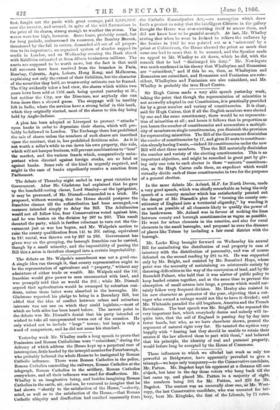Mr. Locke King brought forward on Wednesday his annual Bill
for assimilating the distribution of real property in case of intestacy with the distribution of personalty, and was of course defeated on the second reading by 281 to 84. He was supported only by Mr. Bright, and resisted by Mr. Beresford Hope, whose point was the necessity of maintaining an aristocratic society by throwing difficulties in the way of the conversion of land, and by Sir Roundell Palmer, who held that it was Matter of public policy to keep landed estates together, and at the same time to prevent the absorption of small estates into large, a process which would cer- tainly follow very frequent division. Mr. Henley also resisted in his new character as protector of the poor, objecting that a cot- tager who owned a cottage would not like to have it divided ; and Mr. Whiteside paraded the old bugaboos, America and the French Revolution. The best speech was Mr. BrighA, who repeated the very important fact, which everybody denies and nobody will in- quire into, that the soil of England is passing day by day into fewer hands, but who, as we have elsewhere shown, pressed the argument of natural right very far. He taunted the squires very happily with "fearing lest they should be unable to retain their estates if the law allowed them to part with theni," and believed that his principle, the identity of real and personal property, would before long be accepted by the House of Commons.






























 Previous page
Previous page